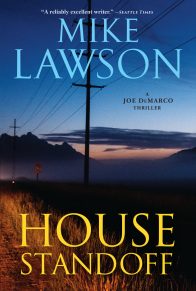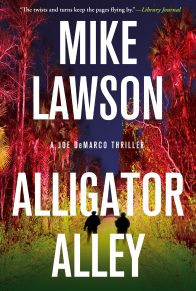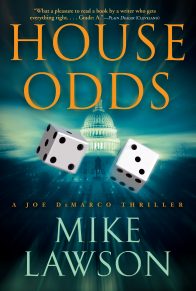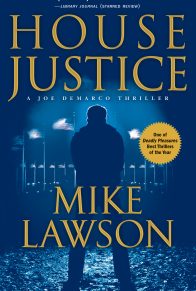The receptionist—Boston-bred, fiftysomething, hard and bright as stainless steel—arched a disapproving eyebrow at DeMarco as he entered Mahoney’s offices.
“You’re late,” she said. “And he’s in a mood today.”
“So since I’m late I guess that means I can go right in,” DeMarco said.
The receptionist was married to a successful accountant, a very nice man, very slim and neat and considerate. On those rare occasions they made love she fantasized about burly Italian construction workers. She used to fantasize about black men with washboard abs and shaved heads but the last few months it had been men who looked like DeMarco: dark hair, blue eyes, a Travolta dimple in his chin—and arms and shoulders made for wife-beater undershirts. However, fantasy man or not, she didn’t approve of tardiness—or flippancy.
“No, you can take a seat,” the receptionist said, flashing a brittle smile, “and in a few minutes, after I finish my tea, I’ll tell him you’re here. Then he’ll make you wait twenty more minutes while he talks to important people on the phone.”
DeMarco knew better than to protest. He took a seat as directed and pulled a copy of People magazine from the stack on the coffee table in front of him. He was addicted to Hollywood gossip but would have died under torture before admitting it.
Thirty minutes later he entered Mahoney’s office. Mahoney was on the phone wrapping up a one-sided conversation. “Don’t fuck with me, son,” Mahoney was saying. “You get contrary on this thing, next year this time, the only way you’ll see the Capitol will be from one of them double-decker buses. Now vote like I told ya and quit telling me about promises you never shoulda made in the first place.”
Mahoney slammed down the phone, muttered “dipshit,” then aimed his watery blue eyes at DeMarco.
“You see Flattery?” Mahoney asked.
DeMarco took an unmarked envelope from the inside breast pocket of his suit and handed it to Mahoney. DeMarco didn’t know what was in the envelope; he made a point of not knowing what was in the envelopes he brought Mahoney. Mahoney sliced open the envelope and took out a piece of paper the size and shape of a check. He glanced at the paper, grunted in either annoyance or satisfaction, and shoved the paper into the middle drawer of his desk.
“And the Whittacker broad?” Mahoney asked.
“She’ll testify at the hearing.”
“What did you have to give her?”
“My word that I wouldn’t tell her husband who she’s been sleeping with.”
“That’s all it took?”
“She signed a prenup.”
“Ah,” Mahoney said. Greed never surprised him—nor did any other human frailty. “So those bastards at Stock Options R Us will spend eighteen months in a country club prison, the guys who lost their pensions will eat Hamburger Helper for the rest of their lives, and her, she’ll get her fuckin’ picture on Time as whistle-blower of the year. Jesus.”
DeMarco shrugged. There was only so much you could do.
“You need anything else?” he asked Mahoney.
“Yeah, I want you to . . .” Mahoney stopped speaking, derailed by his addictions. He reignited a half-smoked cigar then reached for a large Stanley thermos on the credenza behind his desk. The thermos was battered and scarred and covered with stick-on labels from labor unions. Mahoney poured from the thermos and the smell of fresh coffee and old bourbon filled the room.
As Mahoney sipped his morning toddy DeMarco studied the bundle of contradictions that sat large before him. Mahoney was an alcoholic but a highly functional one; few people accomplished sober what he had managed in his cups. He was a serial adulterer yet deeply in love with his wife of forty years. He stretched soft-money laws like rubber bands and took tribute from lobbyists as his royal due, and yet he was the best friend the common man had on Capitol Hill. John Fitzpatrick Mahoney was Speaker of the House of Representatives and only the vice president stood between him and the Oval Office should the President fall. DeMarco doubted the authors had Mahoney in mind when they penned the Twenty-fifth Amendment.
The Speaker was DeMarco’s height, almost six feet, but DeMarco always felt small standing next to him. Mahoney had a heavy chest and a heavier gut, and created the impression of a man perfectly balanced, impossible to rush, fluster, or inflame. His hair was white and very full, his complexion ruddy red, and his eyes sky blue, the whites perpetually veined with red. His features were all large and well formed: strong nose, jutting jaw, full lips, broad forehead. It was a face that projected strength, dignity, and intelligence—it was a face that got a man elected to a national office every two years.
Mahoney swallowed his laced coffee and said, “I want you to go see Andy Banks.”
“The Homeland Security guy?”
“Yeah. He needs help with something.”
“What?”
“I dunno. We were at this thing last night and he said he had a problem. Something personal. He says somebody told him I had a guy who could look into things.”
DeMarco nodded. That was him: a guy who looked into things.
“Go see him this morning. He’s expecting you.”
“What about that problem in Trenton?”
“It’ll wait. Go see Banks.”
2
Andrew Banks, secretary of Homeland Security, was a retired marine three-star general. He was fifty-nine years old, tall and flat-bellied, and his brown suit and olive-green tie resembled the uniform he had worn for thirty-three years. He had a prominent nose, a gray crew cut, and a mouth that was a slash above a thrusting chin. DeMarco noticed that his eyes, magnified slightly by wire-rimmed glasses, were the color of roofing nails.
Behind Banks’s desk, framed by two American flags, was a large pre-9/11 photograph of the World Trade Center. The twin towers had been shot looking up from ground level, and they rose, seemingly forever, white and pristine, into a flawless blue sky. The photograph was a vivid, silent reminder of Banks’s responsibilities.
DeMarco sat in one of three chairs arranged in a semicircle before Banks’s desk. The chair was so uncomfortable that DeMarco wondered if it had seen prior duty in an interrogation room at Guantanamo Bay.
“John Hastings, Congressman Hastings, told me about you,” Banks said. “He said he was being flexed by someone to influence his vote. He wouldn’t tell me who or how, but he said he went to Mahoney for help and the next thing he knows, there you are, prying things off his back. He said you’re some sorta troubleshooter.”
Banks stopped as if expecting a response from DeMarco, but DeMarco, like a good witness in court, hadn’t heard a question so he said nothing.
“Well I have a problem, maybe a big one, and I don’t want a lotta people knowin’ about it. I was wondering what to do when I saw Mahoney at this function last night. I asked him what he could tell me about this guy DeMarco I’d heard about. And Mahoney, that prick, you know what he says to me? He says, ‘I don’t know any DeMarco but he’ll be at your office tomorrow morning.’ Then he walks away and starts chattin’ up some gal half his age.”
She was probably one-third his age, DeMarco thought.
“The thing is, I don’t know zip about you.”
“I’m a lawyer,” DeMarco said.
“A lawyer?” Banks said. The D.C. lawyers he knew looked smooth and sophisticated, slick enough to slide under airtight doors. This DeMarco looked like a kneecapper for an Italian bookie.
“But you’re also an investigator, aren’t you?” Banks said.
“Yeah, sometimes,” DeMarco said, and shifted his butt in the uncomfortable chair. “General, are you going to get around, anytime soon, to telling me what your problem is so I can tell you whether I can help or not?”
Banks smiled. It was a smile that said it’d be a distinct pleasure to take DeMarco out into the parking lot and beat him bloody with his fists and feet.
“Mister, I’m trying to decide if I want to hire you and you’re not helping yourself, sittin’ there saying nothing.”
“General, I’m not here for a job interview and you’re not hiring me. The federal government pays my salary. I’m here because the Speaker told me to come see you.”
Banks opened his mouth to give DeMarco an old-fashioned, Parris Island tongue-lashing, then remembered he wasn’t addressing a buck private. He shook his head and muttered, “This fucking town.”
DeMarco could sympathize with the man’s frustration. He didn’t like D.C. himself most days.
Banks rose from his seat and walked over to a window. He turned his back to DeMarco, shoved his hands into his pockets, and stared down at the traffic on Nebraska Avenue. He pondered his options less than thirty seconds—officers are trained to make decisions—and turned back to face DeMarco.
“Hell, I have to get on with this,” he said. “I have too much on my plate as it is and I can’t take the time to find someone else. And Hastings did recommend you. Hastings was in the corp, you know.”
Semper fi, DeMarco almost said, but controlled his wit. “I didn’t know that,” he said instead and shifted again in the chair. It felt like the damn thing didn’t have a seat cushion, just a thin layer of cloth stretched over the hardest wood on the planet. Or maybe it wasn’t wood, maybe it was metal or that stuff that rhino horns are made of.
“Okay,” Banks said, “but you have to promise me something. You have to promise that you’ll keep everything I’m about to tell you completely to yourself, that you won’t tell another living soul. You promise?”
“I do,” DeMarco said. He considered raising his right hand when he responded but decided that would be a bit much.
Banks studied DeMarco’s face, looking for twitchy-eyed indicators of falsehood, but DeMarco, journeyman liar that he was, gave up nothing. And DeMarco was lying.
“You better be tellin’ the truth, bud, or I’ll rip off your head and shit down your neck.”
DeMarco looked at his watch. He suspected Banks’s problem was a family thing: one of his kids was in trouble or his wife was having an affair with someone human.
“Okay,” Banks said again, and he took in a lungful of air through his big nose as if preparing to dive into deep waters. “I want you to investigate a Secret Service agent named Billy Ray Mattis.”
“An agent?”
“Yeah.”
The name rang a bell.
“Investigate how?” DeMarco said.
“I want you to . . .” Banks stopped.
“Yes,” DeMarco said. It was like trying to get a virgin’s knickers off, getting this guy to say whatever was on his mind. Finally the dam broke.
“I want you to see if Mattis was an accomplice in the assassination attempt on the President.”
“Whoa!” DeMarco said, half rising out of his chair. “Stop right there. Do not say another word.” DeMarco shook his head in disbelief at what he had just heard. “And anyway,” he said, “I thought the guy who shot the President acted alone.”
“Yeah,” Banks said, “he probably did.”
This was ridiculous, DeMarco was thinking. “Look, General,” he said, “you wanted to know about my background. Well, I’ll tell you. I’m a lawyer who does odd jobs for Congress. That’s it. If a constituent turns into a stalker, I make him go sit in a corner. If a congressman thinks his kid is doing drugs, I find out before the kid becomes a liability. If a politician thinks his wife is cheating on him, I make sure she’s not screwing a journalist. That’s the kind of stuff I do, sir. Little stuff . Small stuff . Assassinations are out of my league. Way out of my league. So if you really believe this agent was involved in the assassination attempt, you need to talk to the FBI.”
“I don’t want to do that,” Banks said. “At least not yet.”
“But why not?”
Banks didn’t answer him. He just stood there looking simultaneously guilty, stubborn, and annoyed.
In the four days since the assassination attempt Banks and Patrick Donnelly, head of the Secret Service, had been interviewed by the FBI. The press had camped out on their doorsteps screaming questions at them, and Congress, in a rare and rapid bipartisan gesture, had slapped together a nosy panel that had grilled both men for hours on how the President’s security had been so disastrously penetrated. Banks had had multiple opportunities to tell people he suspected a Secret Service agent of involvement in the assassination attempt—yet here he was, telling DeMarco he couldn’t.
DeMarco knew he should leave. Just get his ass out of this fuckin’ chair, walk out, and never look back. He also knew if he left before finding out what was going on, Mahoney would flay him.
Before DeMarco could decide one way or the other, Banks picked up an index card lying on the blotter in the center of his desk. He held it gingerly, by one corner, as if it was coated with anthrax, and handed it to DeMarco.
“This is what started it all,” Banks said. “That’s not the original but that’s what it said, verbatim. I sent the original to . . . Never mind. Just read it.”
DeMarco read: “Eagle One is in danger. Cancel Chattooga River. The inside ring has been compromised. This is not a joke.” The note was signed: “An agent in the wrong place.”















